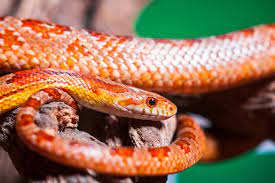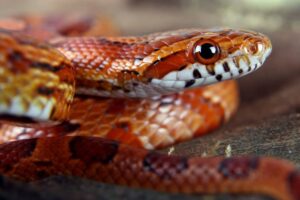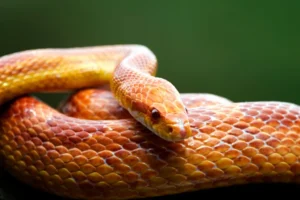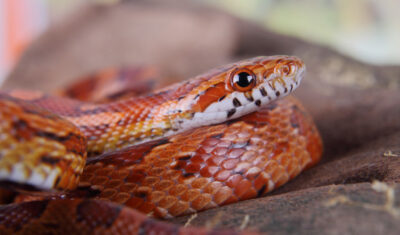Have you ever wondered, “Are corn snakes friendly?” It’s a common question for anyone intrigued by these captivating reptiles. Corn snakes, with their striking patterns and calm demeanor, have become beloved pets in the snake-keeping community.
Yes, corn snakes are generally considered to be friendly and docile creatures. They are popular among reptile enthusiasts and pet owners due to their calm demeanor and ease of care. Corn snakes are known for being tolerant of handling and are often quite gentle when interacting with humans.
However, individual temperament can vary, so it’s essential to handle them gently and respectfully to maintain their trust and friendliness. Overall, though, corn snakes are often considered excellent pets for beginners and experienced reptile keepers alike due to their friendly nature.
Are Corn Snakes Friendly?

Corn snakes are indeed known for their friendly and docile nature, but let’s delve into why that is.
- Temperament: Corn snakes, when compared to some other snake species, tend to be relatively calm and tolerant of handling. This disposition makes them appealing to reptile enthusiasts, including beginners, as they are less likely to exhibit aggressive behavior.
- Captive Breeding: Many corn snakes available in the pet trade are captive-bred, which can contribute to their friendliness. These snakes are often raised in environments where they are accustomed to human interaction from a young age. This early exposure to handling can help them become more comfortable and less prone to stress when being handled by their owners.
- Size and Manageability: Corn snakes are typically small to medium-sized snakes, making them easier to handle than larger species. Their manageable size means they are less intimidating for novice keepers and more convenient in terms of housing and care requirements.
- Consistent Behavior: Corn snakes are generally predictable in their behavior, which can further enhance their appeal as pets. They have simple needs in terms of diet and habitat, and they tend to be less prone to sudden mood swings or unpredictable behavior compared to some other reptiles.
- Adaptability: Corn snakes are adaptable to a range of environmental conditions, which can make them less stressed and more comfortable in captivity. When provided with appropriate temperatures, humidity, and hiding spots, they are more likely to thrive and exhibit their naturally docile behavior.
Overall, while individual corn snakes may vary in temperament, they are commonly regarded as friendly and suitable pets for those interested in keeping reptiles. Proper handling, care, and respect for their needs are essential factors in maintaining their friendliness and well-being.
Characteristics of Corn Snakes
Corn snakes have several distinctive characteristics that make them popular as pets and fascinating creatures to study. Here are some of their key traits:
- Appearance: Corn snakes typically have vibrant colors and patterns, which vary depending on their specific locality or morph. They usually have a base color ranging from orange to brown, with large, dark-bordered blotches running down their back and sides. Their belly scales are typically marked with alternating black and white or cream-colored patterns, resembling the pattern of Indian corn, hence the name “corn snake.”
- Size: Corn snakes are moderate-sized snakes, with adults typically reaching lengths of 3 to 5 feet (90 to 150 centimeters). However, some individuals can grow slightly larger, especially if well-fed and provided with ample space.
- Docile Nature: One of the most notable characteristics of corn snakes is their generally calm and docile temperament. They are known for being relatively easy to handle and tame, especially if they are captive-bred and accustomed to human interaction from a young age.
- Diet: In the wild, corn snakes primarily feed on rodents, birds, and their eggs. In captivity, they are typically fed a diet of appropriately sized mice or rats. They are constrictors, meaning they wrap around their prey to suffocate it before consuming it whole.
- Habitat: Corn snakes are native to the southeastern United States, where they inhabit a variety of habitats, including forests, fields, and farmland. They are adept climbers and can often be found in trees or bushes, as well as on the ground.
- Reproduction: Like many snakes, corn snakes are oviparous, meaning they lay eggs. Breeding usually occurs in the spring, with females laying clutches of eggs in secluded spots such as rotting logs or underground burrows. The female will then abandon the eggs, and they hatch after an incubation period of around 60 to 65 days.
- Longevity: With proper care, corn snakes can live for more than 15 years in captivity. Providing them with a suitable habitat, proper nutrition, and regular veterinary care can help ensure a long and healthy life.
These characteristics contribute to the appeal of corn snakes as pets and make them fascinating subjects for reptile enthusiasts and researchers alike.
Understanding Corn Snake Temperament

Understanding the temperament of corn snakes is crucial for anyone considering them as pets or working with them in any capacity. Here are some key points:
- Docility: Corn snakes are generally known for their docile nature. Compared to many other snake species, they are often quite tolerant of handling and are less likely to show aggression when properly cared for. This makes them popular choices for beginner snake keepers.
- Individual Variation: While corn snakes are typically docile, it’s essential to remember that individual temperament can vary. Some snakes may be naturally more shy or nervous, while others may be exceptionally calm and relaxed. Factors such as genetics, early handling experiences, and environmental conditions can influence an individual snake’s temperament.
- Handling: Regular, gentle handling from a young age can help ensure that corn snakes become accustomed to human interaction and are more comfortable being handled. However, it’s crucial to approach handling with respect for the snake’s comfort and boundaries. Handling sessions should be brief initially and gradually increased as the snake becomes more accustomed to the process.
- Signs of Stress: Even typically docile corn snakes can exhibit signs of stress or discomfort in certain situations. Common signs of stress in snakes include defensive postures (such as coiling or hissing), rapid breathing, attempting to escape handling, and refusing food. It’s essential to recognize these signs and adjust handling and husbandry practices accordingly to minimize stress.
- Environmental Factors: The environment in which a corn snake is kept can also influence its temperament. Snakes that are kept in inadequate or stressful environments may be more prone to stress and exhibit defensive behaviors. Providing appropriate habitat conditions, including proper temperature, humidity, hiding spots, and enrichment, is essential for promoting a snake’s overall well-being and reducing stress.
- Health Issues: Health problems can also affect a snake’s temperament. Snakes that are sick or in pain may exhibit defensive behaviors as a natural response to feeling vulnerable. Regular veterinary check-ups and prompt attention to any signs of illness or injury are essential for maintaining a snake’s health and well-being.
Overall, while corn snakes are generally known for their friendly and docile temperament, it’s essential to approach them with respect and understanding of their individual needs and preferences. By providing proper care, handling, and environmental enrichment, corn snake owners can foster positive relationships with their pets and enjoy the unique companionship that these fascinating reptiles offer.
Signs of a Friendly Corn Snake
Recognizing signs of friendliness in a corn snake can help owners understand and appreciate their pet’s behavior. Here are some common signs that indicate a corn snake is friendly and comfortable with human interaction:
- Curiosity: Friendly corn snakes are often curious and may explore their enclosure when approached or interacted with. They may investigate their surroundings, including their owner’s hand, without displaying defensive behaviors.
- Relaxed Body Language: A friendly corn snake will typically exhibit relaxed body language when handled or approached. This includes a straight, relaxed posture with little to no defensive or defensive body language such as coiling, hissing, or striking.
- Tolerance of Handling: Friendly corn snakes are generally comfortable being handled and may remain calm or even appear to enjoy being held. They may crawl calmly through their owner’s hands or wrap around their arm or wrist without attempting to escape or show signs of stress.
- Active and Alert: While corn snakes are generally calm, friendly individuals may be more active and alert when interacting with their owner. They may flick their tongue to gather scent information or move around their enclosure to explore when approached.
- Feeding Readiness: A friendly corn snake is typically eager to eat and may approach its owner’s hand or the opening of its enclosure when food is offered. They may also readily accept food without hesitation, indicating a positive association with their owner’s presence.
- Minimal Defensive Behavior: Friendly corn snakes rarely display defensive behaviors such as hissing, striking, or hiding when approached or handled. They may occasionally exhibit mild defensive postures, such as flattening their body or flicking their tongue rapidly, but these are usually brief and non-threatening.
- Bonding with Owner: Over time, friendly corn snakes may develop a bond with their owner and seek out interaction or attention. They may show recognition of their owner’s presence, such as approaching the front of their enclosure when they enter the room or resting calmly in their owner’s hand during handling sessions.
Additionally, some snakes may take time to acclimate to their new environment or owner and may initially display more reserved behavior. With patience, consistent handling, and positive reinforcement, most corn snakes can become friendly and tolerant pets.
Tips for Building a Positive Relationship

Building a positive relationship with your corn snake is a rewarding process that requires patience, consistency, and understanding. Here are some tips to help foster a strong bond with your pet:
- Handle with Care: Handle your corn snake gently and with respect. Avoid sudden movements or actions that may startle or stress your snake. Support its body properly and allow it to move at its own pace during handling sessions.
- Start Slowly: If your corn snake is new to handling, start with short, low-stress sessions and gradually increase the duration and frequency as it becomes more comfortable. Respect its boundaries and avoid forcing interaction if it shows signs of stress or discomfort.
- Be Consistent: Regular, consistent handling is essential for building trust and familiarity between you and your corn snake. Aim for daily handling sessions, but be mindful of your snake’s individual needs and preferences. Even brief, regular interactions can help strengthen your bond over time.
- Positive Reinforcement: Use positive reinforcement techniques to reward desired behaviors and encourage trust and confidence in your snake. Offer treats or rewards during handling sessions or immediately afterward to associate handling with positive experiences.
- Respect Boundaries: Pay attention to your corn snake’s body language and respect its boundaries. If it shows signs of stress or discomfort, such as defensive postures or attempts to escape, gently return it to its enclosure and try again later. Never force interaction or handling if your snake is not receptive.
- Provide Enrichment: Offer environmental enrichment, such as hiding spots, climbing branches, and tunnels, to promote physical and mental stimulation for your corn snake. A enriched environment can help reduce stress and boredom, leading to a happier and more content pet.
- Observe and Learn: Take the time to observe your corn snake’s behavior and preferences. Learn to recognize its individual cues and signals, such as feeding behavior, exploring patterns, or preferred hiding spots. This understanding will help you better meet its needs and strengthen your bond.
- Create a Routine: Establish a consistent routine for feeding, handling, and maintenance tasks to provide structure and predictability for your corn snake. Consistency helps reduce stress and anxiety and allows your snake to feel more secure in its environment.
- Be Patient: Building a positive relationship with your corn snake takes time and patience. Understand that each snake is unique and may progress at its own pace. Be patient, remain calm, and celebrate small victories along the way.
By following these tips and investing time and effort into nurturing your relationship, you can develop a strong and rewarding bond with your corn snake that will last a lifetime.
Potential Challenges in Handling Corn Snakes
Handling corn snakes can be a rewarding experience, but it’s essential to be aware of potential challenges that may arise, especially for new or inexperienced owners. Here are some common challenges associated with handling corn snakes:
- Initial Fear or Anxiety: Newly acquired corn snakes may be nervous or stressed when first introduced to handling. It’s essential to give them time to acclimate to their new environment before attempting to handle them. Start with short, gentle handling sessions and gradually increase the duration and frequency as the snake becomes more comfortable.
- Defensive Behavior: Corn snakes may exhibit defensive behaviors if they feel threatened or stressed. This can include hissing, striking, or attempting to escape when approached or handled. It’s crucial to approach handling with patience and respect for the snake’s boundaries to minimize stress and avoid triggering defensive responses.
- Overhandling: Handling corn snakes too frequently or for extended periods can cause stress and discomfort. Snakes need time to rest and recover between handling sessions, so it’s essential to strike a balance and avoid overhandling. Pay attention to your snake’s body language and behavior to gauge its comfort level and adjust handling accordingly.
- Temperature Sensitivity: Corn snakes are ectothermic animals, meaning they rely on external sources of heat to regulate their body temperature. Handling a snake that is too cold can be uncomfortable for both the snake and the handler. Ensure that your snake’s enclosure is appropriately heated, and avoid handling it if it feels excessively cold to the touch.
- Escape Attempts: Corn snakes are curious and agile animals that may attempt to escape from their enclosure if given the opportunity. It’s essential to secure the enclosure with a tight-fitting lid and regularly check for any gaps or openings that could allow the snake to escape. When handling your snake, do so in a secure area free from potential escape routes.
- Aggression during Feeding: Corn snakes can become food-motivated and may exhibit aggressive behavior, such as striking or biting, during feeding. It’s essential to avoid handling your snake immediately before or after feeding to reduce the risk of being mistaken for prey. Give your snake time to digest its meal undisturbed.
- Health Concerns: Sick or injured corn snakes may be more sensitive to handling and may exhibit defensive or aggressive behaviors as a result of pain or discomfort. It’s crucial to monitor your snake’s health closely and seek veterinary care if you notice any signs of illness or injury.
By being aware of these potential challenges and taking appropriate precautions, you can minimize stress and ensure a positive handling experience for both you and your corn snake. Patience, consistency, and respect for the snake’s needs and boundaries are key to building trust and fostering a strong bond with your pet.
Conclusion
Are corn snakes friendly? Absolutely. These captivating reptiles are renowned for their docile nature and adaptability to human interaction. With gentle handling, proper care, and respect for their needs, corn snakes can become cherished companions, offering their owners a rewarding and enriching relationship.

